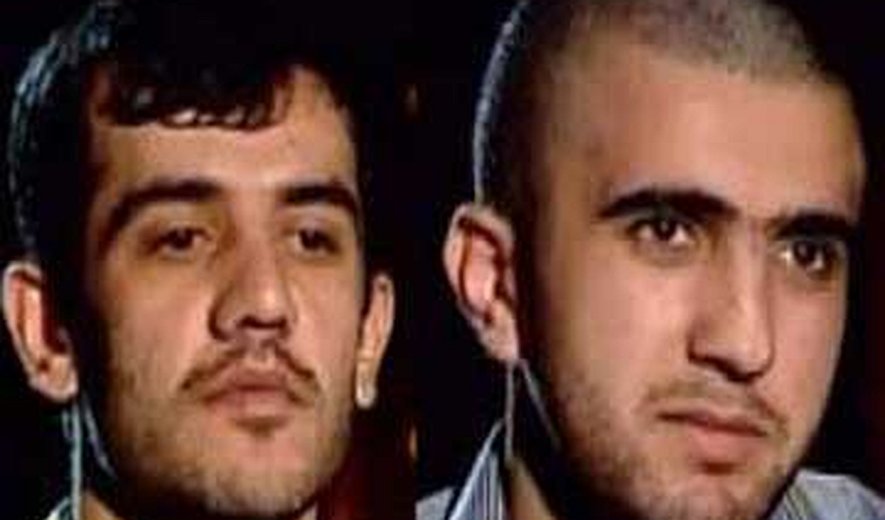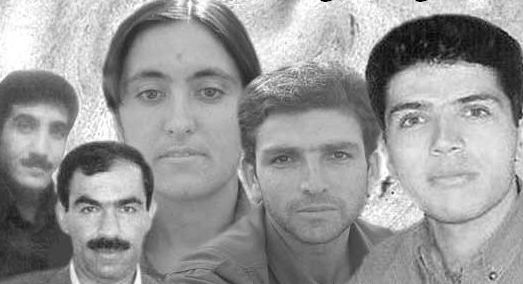A letter by death row prisoners Zanyar and Loghman Moradi:

"Which Generation Will Be the One to Hear the Last News of Execution?"
Iran Human Rights, May 9, 2012 — Zanyar and Loghman Moradi, two Kurdish citizens held in Rajai Shahr prison, who are at imminent risk of execution, have written a letter about Farzad Kamangar and the other political prisoners executed by Iranian authorities in Evin prison on May 9, 2010. The letter was sent by Iranian activists to Iran Human Rights for publication.
We live in a land where you cannot separate and detach yourself from past stories, events, and adventures. And, we cannot pass by [the month of May] without paying homage to the memories of Farzad, Farhad, Ali and Shirin.
It has been two years since the event that none of us want to hear about— the day when the Iranian people everywhere were as sad as Kurdistan and the Kurdish people. It was the day when another page in Iran’s tragic history was written in the land of Kurdistan. The Kurdish history has seen so many bitter days throughout the years.
When we listen to [the stories] of our elders it makes it difficult to experience peaceful and joyful days, [because we cannot] ignore and abandon the many events, pains, and sufferings that have become an integral part of Kurdistan: the military campaigns, the ideological conflicts, the sacking of this city and the massacre of people in another city. Sometimes bullets were fired to assassinate and other times to silence the voices of dissent. In the course of a greedy and obstinate war, bombardments and missiles were launched by both sides— and tragedies like massacres, chemical attacks, and revenge caused the Kuridsh land to be bereaved of [lively] moments. And, conspiracies and sentiments of bitterness aimed to rob us of our friendships and unity in Iran. The arrests, reactions, massacres, hate, endless executions, and fate of our missing loved ones made friendship, peace, sweet songs, pleasant roads, and all the beauty of our land more foreign and unattainable. The elders are tired, worn out, and brokenhearted.
We live in a land where you cannot separate and detach yourself from past stories, events, and adventures. And, we cannot pass by Ordibehesht [the second month in the Iranian calendar; equivalent to the zodiac sign Taurus] without paying homage to the memories of Farzad, Farhad, Ali and Shirin. Before we experienced the bitter, dark days of imprisonment and torture, and execution had not yet cast its heavy shadow over us, these names told a nostalgic and painful story. We had been following the news related to them. We accompanied them in their experience, [which helped us] understand a little about prison and its atmosphere. The news [of their execution] was a repetition of what was happening for years.

There was a moment of worry when concern was raised. There was also a moment of hope that took root— a hope that was not supposed to take root in the midst of all the unfortunate events. During those days [before the executions and our imprisonment], we lived with the smiles and tears of them and their families. We tried to put ourselves in their shoes so we would be able to accompany them on the quest to achieve their wishes and demands. [We tried to] understand what they were saying and forget the pain that they covered up under layers of patience and hope. However, we never thought to be in the same position as them.
[Now that we are on] death row, we constantly reflect on memories of them. [I, Zanyar, remember] the day when my mother was crying as Farzad’s mother was sobbing and Farhad’s children were mourning. We could not fathom how a mother felt wile awaiting his son/daughter, and we could not understand what it meant for her to find her child in pain. We did not realize that the pure tears of a mother could find their way through the dark halls of the prison and offer a ray of hope to the children. We had heard about that father who would bend under pressure so that his children could have the chance to resist and hold their heads up high. But, we never knew that one year of imprisonment for a son would bring sadness to a father and age him.
[Farzad Kamangar], a young teacher working in impoverished villages, had one hope: to raise a generation who will be able to work to develop Kurdistan and reclaim the rights of which the Kurdish people have been deprived of. [He wished to] sacrifice many things for the prosperity and glory of Kurdistan and to attain what our elites wished for. He was a teacher who loved people for their humanity. He was struggling for the Kurdish and Iranian people, for human beings, for humanity. Alas, he was to be executed.
We faced similar circumstances when we were arrested. Months of solitary confinement and security detentions prevented us from hearing any news [on the executions] until we finally heard the news nine months following that horrible day. It was an excuse [for us] to sob and cry. When we heard the news, we did not need to try to imagine it based on what others were saying. We understood their ordeal through experiencing solitary confinement, black and insufferable torture, deprivation from seeing our families, looming death sentences, unfair trials, bitter and dark stories of a prisoner, and various other stories told by those who were inmates with Farzad, Farhad, and Ali. [We heard about their] nostalgia, their land, their patience and serenity, their endurance of tortures without giving as much as a frown, the low moments as well as sweet moments during visits, their love for Kurds and Kurdistan, their memories of nature, and their joyous days in Qandil and other mountains that reflect their steadiness and resistance. We heard mostly about Farzad [Kamangar], who was always smiling and laughing.
The prison transfers and the summons were both indications of a looming event, and perhaps even….finally, the most bitter event took place. Everyone else was anxious but they were steady. They spent the last night together. There are stories about that last night before their executions. We heard about the night we have not yet experienced.
We do not know to what extent our nearly three years of detention has been similar to their nearly four years.
How long will this continue for?! Kurdistan has seen so many of these dark and sour events. The strength of the rulers is proven through the execution of the sons and daughters of this land. For how much longer will [they] kill and murder?! Blood cannot wash blood. Violence is not quenched through violence. Violence leads to violence, and bloodshed will bring about more bloodshed. Until when will the sounds of bullets and mourning on dead bodies silence and drown joyous cheers? How much more violence will overpower peace and happiness? Which generation will be the last to hear the ominous news of executions? Will the day come when the sad stories of violence and the incitement of violence are not heard?
May our blessed memories live long every day and during every moment— especially on May 9, the day they walked and chanted to the gallows so we may remember that each step we take should be toward life and joy (even when sour experiences and death prevail).
 Zanyar and Loghman Moradi
Zanyar and Loghman Moradi
 Rajai Shahr Prison
Rajai Shahr Prison
 2012
2012

